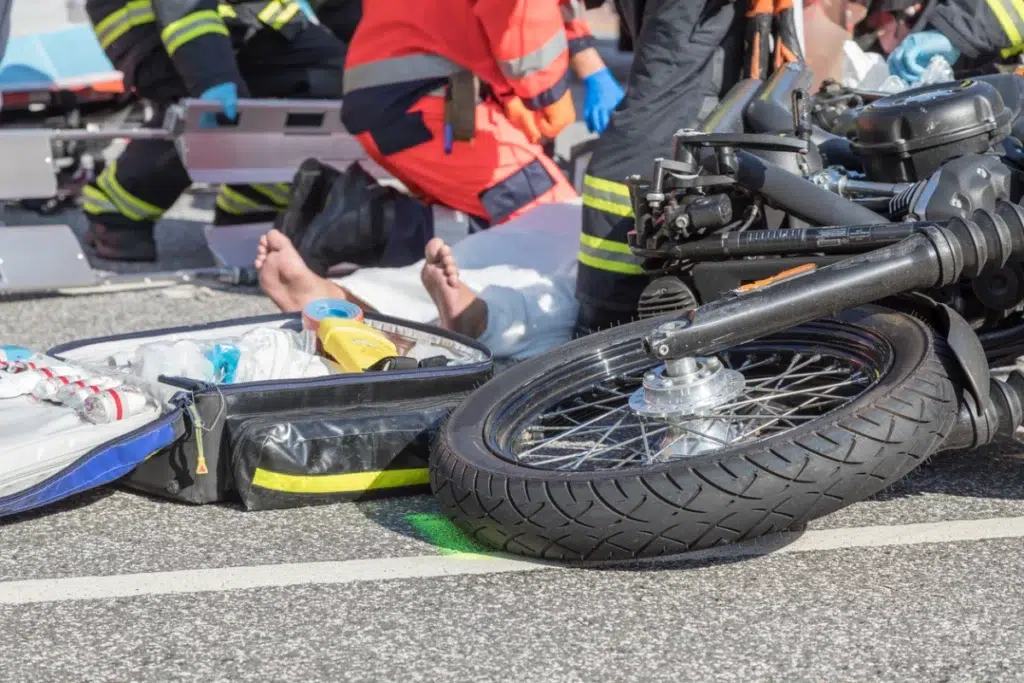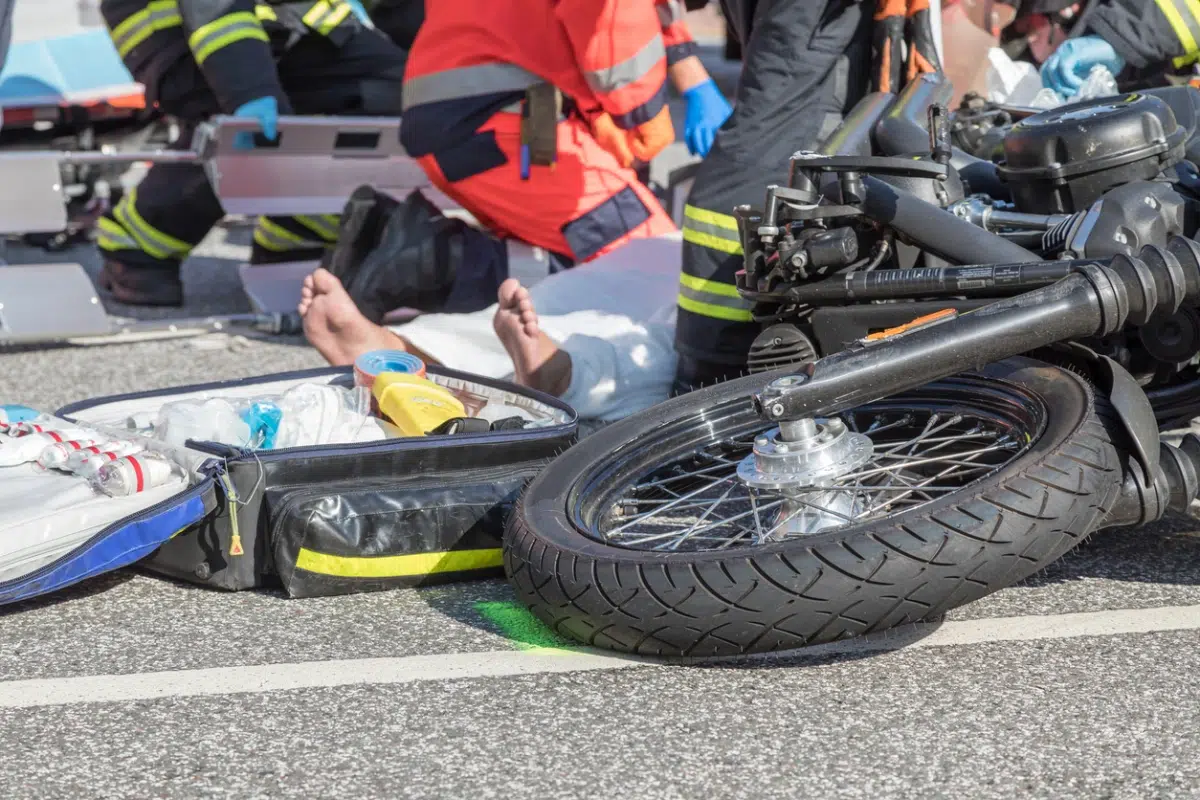
Riding in San Francisco is an incredible experience, but when a motorcycle accident happens, life can take a sharp, unexpected turn. Beyond dealing with injuries and emotional stress, you might be looking at a Motorcycle Accident Lawsuit. Understanding what’s involved can feel overwhelming, but it doesn’t have to be.
This guide will break down what to expect in a motorcycle accident lawsuit, step by step. At Delfino, Green, & Green, we’ve helped countless riders navigate motorcycle accidents and are here to support you through your personal injury claim. We know the unique challenges riders face and are proud of our record-winning motorcycle accident claims in San Francisco.
Understanding the Motorcycle Accident Lawsuit Process
So, what exactly is a Motorcycle Accident Lawsuit Process? Think of it as a formal way to sort things out and get you the compensation you deserve after a crash. It has several stages, each with its own things to know.
While many cases get settled without ever seeing a courtroom, knowing what a lawsuit involves means you’re prepared for anything. And if you’re facing a Motorcycle Accident Lawsuit in San Francisco, there will be local court rules and timelines that come into play too.
Initial Steps After a Motorcycle Accident: Preparing for a Lawsuit
What you do right after your motorcycle accident can make a big difference if you decide to file a lawsuit. Here are some key things to keep in mind:
- Get Medical Help ASAP: Your health comes first, always. Even if you think you’re okay, some injuries can creep up on you later. Plus, your medical records are super important evidence.
- Call the Police: Make sure an official accident report gets filed. This report is a key piece of the puzzle.
- Gather Info at the Scene (If You Can): Try to get names, contact details, and insurance information from everyone involved. Snap photos and videos of the scene, your injuries, your bike, and any other vehicles. Witness contact info is gold too!
- Hold Onto Evidence: Keep every piece of paper related to the accident – medical bills, repair quotes, emails with insurance companies. Don’t get your motorcycle fixed until it’s been properly looked at for evidence.
- Watch What You Say: It’s natural to want to talk about what happened, but try not to admit fault or give too many details to other parties or insurance adjusters without talking to a lawyer first.
- Talk to a Motorcycle Accident Attorney: This is a really important step. A good lawyer can explain your rights, walk you through the lawsuit process for motorcycle accidents, and start putting your case together.
Taking these steps will set you up better for what happens in a Motorcycle Accident lawsuit.
Filing the Motorcycle Accident Lawsuit: What to Expect
If the insurance company isn’t offering a fair settlement, your lawyer might suggest it’s time to file a lawsuit. Here’s what that looks like:
- The “Complaint”: Your attorney will write up a formal document called a “Complaint” (or sometimes a “Petition”). This paper tells your side of the story: who you’re suing (the defendant), what happened in the accident, what injuries and damages you’ve suffered, and why you believe the defendant is legally responsible.
- Filing and “Serving”: The Complaint gets filed with the court. Then, a copy of it, along with a “Summons” (which is an official notice about the lawsuit), has to be officially delivered to the person you’re suing. This is called “service of process.”
- The Defendant’s Reply: The person you’re suing then has a certain amount of time (usually 30 days here in California) to file an “Answer.” In this document, they’ll respond to what you’ve said in your Complaint – they might agree with some parts, deny others, and list their own defenses. Sometimes, they might even file a “Cross-Complaint” if they think you were partly at fault.
The Discovery Phase: Gathering Evidence and Building Your Case
After the first set of legal papers are filed, your lawsuit moves into what’s called the “discovery” phase. Get ready, because this can often be the longest part of the whole process. This phase can make or break your case—it’s where both sides gather the evidence they need to argue their side. Here’s how it usually happens:
- Written Questions and Requests:
- Interrogatories: These are written questions that you and the other side send to each other, and they have to be answered under oath.
- Requests for Production of Documents: This is a formal request for important papers like medical records, the police report, insurance policies, photos, and videos.
- Requests for Admission: These are statements that the other side has to either admit or deny, again, under oath.
- Depositions: Think of these as interviews under oath. You, the other party, and key witnesses will be asked questions by the lawyers. Everything said is recorded by a court reporter. Don’t worry, your lawyer will help you get ready for yours and will be there to question the other side.
- Expert Witnesses: For many motorcycle accident cases, you’ll need experts. These could be accident reconstruction specialists who can figure out exactly how the crash happened, medical experts to talk about your injuries and what care you’ll need in the future, and even financial experts to calculate your lost wages and any impact on your future earnings.
Discovery is all about digging deep to build the strongest case possible and to see the strengths and weaknesses on both sides. It’s a really big part of what to expect in a motorcycle accident lawsuit.
Settlement Negotiations vs. Trial: What to Expect
As your case moves along, especially after a good chunk of discovery is done, there will likely be talks about settling.
- Settlement Negotiations: The truth is, most motorcycle accident lawsuits get resolved through a settlement before they ever go to trial. These talks can be informal chats between the lawyers, or they can be more structured, like in mediation. Mediation is when a neutral third person (the mediator) helps you and the other side try to find a solution you can both agree on. A settlement usually means the other side’s insurance company agrees to pay you a certain amount of money, and in return, you agree to drop the lawsuit.
- Trial: If you just can’t reach a settlement agreement, then your case will head to trial. At trial, both you and the other side will present your evidence (including witness testimony and things like photos or documents) to a judge or a jury. Your lawyer will tell your story, question the other side’s witnesses, and make legal arguments. Then, the judge or jury will make a final decision (the verdict) about whether the other person is responsible and, if so, how much money they should pay you.
Knowing that your case could either settle or go to trial helps manage San Francisco Motorcycle Accident expectations.
How the Statute of Limitations Affects Your Motorcycle Accident Lawsuit
This is a super important one: the “statute of limitations.” It’s basically a legal deadline for how long you have to file a lawsuit after you’ve been injured. Here in California, for personal injury claims like those from motorcycle accidents, you generally have two years from the date of your injury to file that lawsuit.
If you miss this two-year window, you’ll probably lose your chance to get any compensation for your injuries, no matter how strong your case might be. There are a few rare exceptions that can pause or “toll” this deadline – for example, if the injured person was a minor at the time of the accident, or if they were mentally incapacitated.
But it’s absolutely crucial to talk to a lawyer as soon as you can after your accident to make sure you don’t miss this critical deadline.
Verdict and Compensation: What Happens After a Lawsuit?
- If You Settle: If your case settles, you’ll usually sign a release agreement. Once that’s done, the agreed-upon money will be paid. Your lawyer will take care of things like paying back any medical providers who have a lien on your settlement and covering their legal fees, then the rest of the money is yours.
- If You Go to Trial and Win: If the judge or jury sides with you, they will award you damages. This money can cover:
- Economic Damages: These are for the actual financial losses you’ve had – things like medical bills (what you’ve already paid and what you’ll need in the future), lost wages from being out of work, any impact on your ability to earn money down the road, and damage to your motorcycle.
- Non-Economic Damages: These are for losses that don’t have an exact price tag, like your pain and suffering, emotional distress, not being able to enjoy life the way you used to, and any disfigurement.
- Punitive Damages (Rare): Sometimes, if the other person’s actions were incredibly reckless or intentionally harmful, a court might award punitive damages. These are rarely awarded and typically only granted in cases of gross negligence or intentional misconduct. The idea is to punish the wrongdoer and try to stop similar behavior from happening again.
- Appeals: After a trial, if either you or the other side thinks there were legal mistakes made during the trial, they might be able to appeal the decision to a higher court. An appeal can add more time and cost to the whole process.
- Getting Your Money: If you win at trial, the next step is actually collecting the money from the defendant or their insurance company.
Knowing these possible endings is a key part of understanding what happens in a Motorcycle Accident lawsuit.
Why Delfino Green & Green Is the Right Law Firm for Your Motorcycle Accident Lawsuit
Going through a Motorcycle Accident Lawsuit can feel like a tough ride, but you don’t have to go it alone. At Delfino, Green & Green, we get the ins and outs of California personal injury law and really understand what motorcycle riders are up against. We’ve successfully helped many riders with their Motorcycle Accident Lawsuits in San Francisco and all over Northern California.
Here’s why we think we’re the right team for you:
- We Know Our Stuff: Our lawyers have been handling motorcycle accident claims for years – it’s what we do.
- We’ve Got the Resources: We can fully investigate your accident, bring in the best expert witnesses if needed, and we’re not afraid to take your case to trial.
- You’re Our Priority: We put our clients first. That means keeping you in the loop and making sure you understand what to expect in a motorcycle accident lawsuit from start to finish.
- No Win, No Fee: We work on a contingency fee basis. That means you don’t pay us any attorney fees unless we get money for you.
If a motorcycle accident has turned your life upside down, reach out to Delfino, Green & Green today for a free chat about your situation. Let us help you understand your rights and fight to get you the compensation you deserve.



